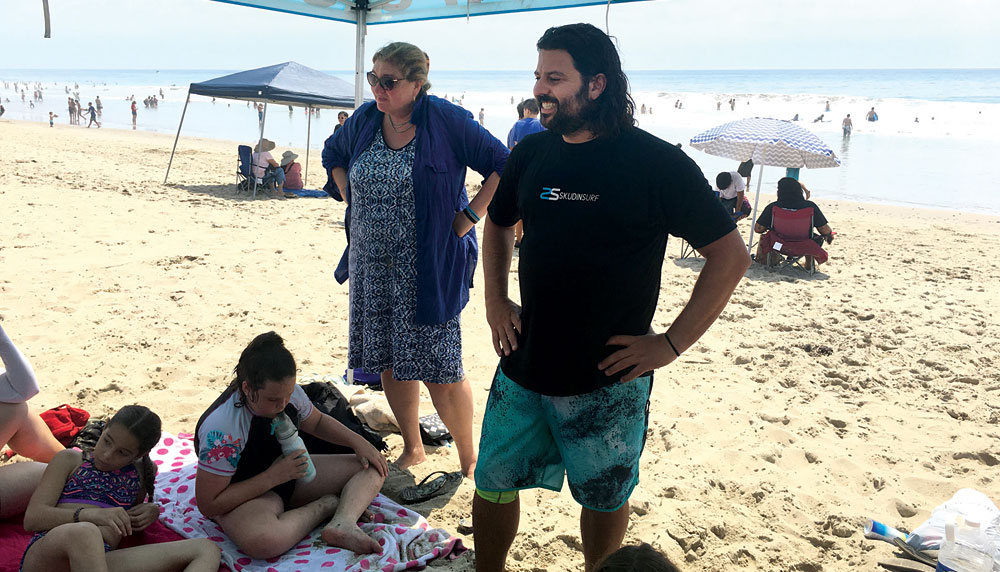Sababa Surf Camp connects kids with surfing, sand and Judaism
September 6th, 2017
Danny Mishkin had just one question for the 14 teens and tweens in his Sababa Surf Camp in Malibu over Labor Day weekend: “What’s your sababa level?”
Sababa is Hebrew slang for “cool,” “all good,” “no worries.” At Sababa Surf Camp, a New York-based camp for tweens and teens combining surfing with Jewish spirituality, if a person’s sababa level is 1, it means they are chill, in the moment, embracing their surroundings. If a person’s sababa level is 10, it means that person is too stressed out, needs to stop thinking so much about schoolwork and social drama and just hang 10.
Hannah Baron, an 11th-grade student at de Toledo High School, came to the Sept. 3 camp, which continued on Sept. 4, not having been on a surfboard for two years. She was happy to get out and hit the waves at Malibu’s Zuma Beach.
This was the first time the New York-based camp came to Southern California after launching three years ago on the East Coast. The camp will return to the Los Angeles area in October and during Passover.
Mishkin said he and his co-director, Lynn Lancaster, worked with many partners in bringing the program to Southern California, including The Jewish Federation of Greater Los Angeles’ L.A. Jewish Teen Initiative, the Jim Joseph Foundation and the Jewish Community Foundation of Los Angeles.
Mishkin, 38, is the former director of the Waxman Hebrew High School and Teen Engagement program at Temple Israel of Great Neck, N.Y. Lancaster is the educational director of the religious school at the Forest Hills Jewish Center, a Conservative institution in New York. Their goal is to provide young people with an alternative method of Jewish engagement.
“This is Jewish spirituality by connecting with nature,” Lancaster said.
Eva Chriqui, 11, whose family belongs to Shuvah Israel Torah Center in Pico-Robertson, said she decided to participate in the camp because, “I’ve always wanted to surf, and I felt like it would be a really good experience.”
Lian Ben-David, 10, said the camp altered her thinking about the beach and the ocean.
“Before I came here, I didn’t like the beach. And now I want to kiss the sand,” she said.

From left: Sababa Surf Camp co-directors Lynn Lancaster and Danny Mishkin. Photo by Ryan Torok

Mishkin and Lancaster arranged for transportation to pick up participants from locations in Pico-Robertson and the San Fernando Valley in the morning, in time for the 9:30 a.m. start. The camp usually begins with meditation, followed by surfing. The morning’s high tide provided the necessary wave breaks for the group of beginners to test their skills on long foam boards under the guidance of instructors from the Malibu Makos Surf Club.
“We’re always tide-dependant, we’re always wave-dependant,” Lancaster said.
After three hours of surfing, the camp broke for lunch, followed by meditation. Mishkin told group members to close their eyes and breathe. Life and surfing, he said, have a lot in common.
“The more crazy it is out there [in the ocean], the more calm you have to be. The worst thing you can do is panic,” he said. “Take deep breaths and capture the moment.”
While Mishkin spoke, he struggled to be heard over the roar of the waves and the buzz of surrounding beachgoers — it was Labor Day weekend, after all. As Lancaster watched, she commented that achieving the ultimate sababa level meant nothing if it didn’t come with challenges.
“That’s part of sababa,” she said. “We work with what we have.”
Farrah Zweig, a personal trainer and children’s wellness expert who signed up her daughter, Bryanna, for the camp, said it provided an important life lesson that you can’t be in control of everything. Bryanna is a competitive gymnast, spending 16 hours a week on the extracurricular activity.
“You can’t tell the ocean what to do,” Zweig said. “You have to let go of yourself.”
The campers eventually split into two groups, with half of the campers forming a circle with Lancaster on the wet sand during low tide. Lancaster distributed worksheets featuring quotes from Rabbi Ed Feinstein of Encino’s Valley Beth Shalom, about how prayer is not about asking God to change but about creating change within ourselves. There were references to Rabbi Abraham Joshua Heschel, about how marching for social justice is like praying with one’s feet. And there was text from Pirkei Avot (Ethics of Our Fathers) about how the person who is wise is one who learns from everybody. Lancaster asked each kid to pick a quote to adopt as a “mantra.”
Meanwhile, the other group continued guided meditation with Mishkin, before breaking off with Lancaster to pick mantras of their own.
When the groups came back together before the day concluded at 3 p.m., Mishkin checked in with each of the campers, again asking the only question that really mattered on this particular afternoon of surf, sand and spirituality.
“What’s your sababa level right now?”
“Two!” Baron said.
“Minus one thousand!” Ben-David answered.
Source: “Sababa Surf Camp connects kids with surfing, sand and Judaism,” Jewish Journal of Greater Los Angeles, September 6, 2017